Nigeria LNG Ltd (NLNG) has signed a series of 20-year gas supply agreements with the state-owned NNPC Ltd and several independent oil and gas producers, securing volumes critical to its liquefaction plants and ongoing expansion projects.
Securing Feedgas for Growth
The contracts cover up to 1.29 billion standard cubic feet of gas per day, with supply volumes set to ramp up gradually. The deals include extension options, ensuring stability of feedgas for both existing operations and the $10 billion Train-7 project on Bonny Island, Rivers State, which is now more than 80% complete.
By locking in supply, NLNG aims to mitigate long-standing upstream shortfalls that have hindered gas availability in Nigeria, often exacerbated by pipeline vandalism and infrastructure disruptions.
Broad Industry Collaboration
The agreements were signed not only with NNPC but also with a consortium of energy players, including Shell Nigeria, Oando Group, Aradel Holdings, and First E&P. This reflects NLNG’s deliberate strategy to diversify its gas sources, particularly after several international oil companies divested from onshore assets in Nigeria.
NNPC Group CEO Bayo Ojulari described the partnerships as a gateway to “growth, collaboration, and shared prosperity,” while NLNG Managing Director Philip Mshelbila emphasized that these long-term contracts mark a pivotal step toward addressing Nigeria’s structural gas supply constraints.
Supporting Nigeria’s Energy Transition
Natural gas is central to Nigeria’s energy transition strategy, providing a bridge between oil dependency and renewable adoption. The supply agreements are expected to:
- Strengthen NLNG’s export capacity, boosting foreign exchange earnings.
- Support domestic industrialisation through greater access to gas.
- Reinforce Nigeria’s positioning as a competitive LNG hub in global markets.
By stabilizing feedgas, NLNG will be better placed to meet both export commitments and local demand, ensuring that natural gas plays its dual role as an economic driver and cleaner energy source compared to crude oil.
Strategic Outlook
With Train-7 nearing completion, NLNG’s production capacity is set for a significant boost. The long-term contracts not only safeguard feedstock but also enhance Nigeria’s credibility as a reliable LNG supplier. For the wider industry, the move could accelerate investment in gas infrastructure and contribute to broader industrial development.
In an environment where energy security and diversification are critical, NLNG’s agreements represent both a practical solution to supply challenges and a symbolic step in Nigeria’s transition from an oil-led to a gas-powered economy.
Partner With Us
Want to feature your brand, business, or service on 365247 — Whether you’re looking to sponsor, collaborate, or build presence within our ecosystem, we’d love to explore it with you.
Submit your interest here


